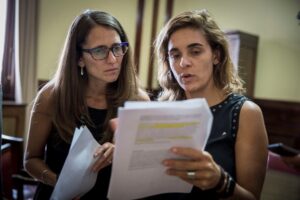 I was truly surprised to read about efforts by the president of Argentina, Alberto Fernández, to expand the rights of women in his country. Alisha Haridasani Gupta and Daniel Politi, writing for the New York Times, explain that President Fernández fulfilled a campaign promise by legalizing abortion at the end of 2020 and vows to “help mothers get back to work [after the pandemic] by building more preschools” and to fight against gender violence. Fernández deserves credit for putting the structures in place in his government to implement this feminist agenda, and he has put three strong feminists in charge of driving these changes:
I was truly surprised to read about efforts by the president of Argentina, Alberto Fernández, to expand the rights of women in his country. Alisha Haridasani Gupta and Daniel Politi, writing for the New York Times, explain that President Fernández fulfilled a campaign promise by legalizing abortion at the end of 2020 and vows to “help mothers get back to work [after the pandemic] by building more preschools” and to fight against gender violence. Fernández deserves credit for putting the structures in place in his government to implement this feminist agenda, and he has put three strong feminists in charge of driving these changes:
- Elizabeth Gómez Alcorta, the country’s first minister of Women, Genders and Diversity
- Vilma Ibarra, the president’s top legal adviser who wrote the country’s landmark abortion bill
- Mercedes D’Alessandro, the country’s first national director of economy, equity, and gender within the Economy Ministry
These three leaders sprang into action when the COVID pandemic hit just after the new president was inaugurated in December 2019. In fact, the United Nations ranked Argentina number one for gender-sensitive COVID-19 responses in the world. Gómez Alcorta, Ibarra, and D’Alessandro explain that the gender-sensitive responses fall into four categories:
- Gender-based violence—The three leaders created enhanced communication channels through WhatsApp and email to enable women to reach out for help during the pandemic lockdown and declared services related to gender-based violence essential services.
- Food emergencies services—Food delivery and protection from eviction were implemented, especially with regards to the trans community, which is particularly vulnerable in Argentina.
- Emergency family income—An emergency family allowance, which reached nine million people, was implemented to acknowledge that many women work in the informal sector and often do unpaid care work. The authors cite studies published by the Economy Ministry showing that unpaid care and domestic work are the largest sector of Argentina’s economy and that 75 percent of that work is carried out by women.
- Professionalizing care work—Gómez Alcorta notes that, postpandemic, the administration plans to create eight hundred kindergartens, nurseries, and day-care centers around the county and will revise parental leave policies to create more equality in the workplace. The eight hundred childcare programs will not only help mothers go back and stay in the workforce, they will also professionalize care work and recognize the value of that work.
D’Alessandro explains that many gender-based problems still exist in the country. There are large gender gaps in the judiciary, trade unions, and the business sector, and the society is “still a male-dominated patriarchal, unequal structure with clear discrimination against women.” She goes on to state, “We’re not against men. All we want to do is take apart a system that has abused and hurt women.” I believe their attention to structural changes will help society for the better.
Photo courtesy of Ministerio de Cultura de la Nación (CC BY-SA 2.0)